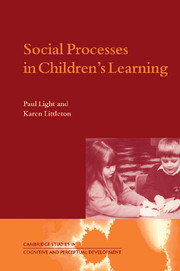Book contents
- Frontmatter
- Contents
- List of figures
- Preface
- Acknowledgements
- 1 Peer interaction and learning: perspectives and starting points
- 2 Peers and puzzles: a first series of studies
- 3 Computers and learning
- 4 Kings, Crowns and Honeybears: a second series of studies
- 5 Gender agendas
- 6 Social comparison and learning
- 7 Interaction and learning: rethinking the issues
- References
- Index
- Cambridge Studies in Cognitive and Perceptual Development
7 - Interaction and learning: rethinking the issues
Published online by Cambridge University Press: 22 September 2009
- Frontmatter
- Contents
- List of figures
- Preface
- Acknowledgements
- 1 Peer interaction and learning: perspectives and starting points
- 2 Peers and puzzles: a first series of studies
- 3 Computers and learning
- 4 Kings, Crowns and Honeybears: a second series of studies
- 5 Gender agendas
- 6 Social comparison and learning
- 7 Interaction and learning: rethinking the issues
- References
- Index
- Cambridge Studies in Cognitive and Perceptual Development
Summary
Talking and learning
The central thesis of this book is that cognitive development and learning are fundamentally social processes. Whilst it is undoubtedly important to consider the role of more experienced cultural actors in promoting development and learning, our own concern has been mainly with the contribution of interaction between peers.
Our earliest investigations of children's collaborative learning and problem solving addressed the issues of whether and when working collaboratively in pairs would prove more effective than working alone. As Chapters 2 and 4 make clear, we soon amassed compelling evidence that in certain circumstances two heads were indeed better than one. This research, which focused primarily on the outcomes and products of collaborative work, was later complemented by a series of studies designed to shed light on the processes of collaborative learning. At first our analyses of the talk and joint activity of children were informed by neo-Piagetian conceptions of ‘socio-cognitive conflict’. Our primary research question was whether individual progress in understanding could be promoted through exposure to the conflicting ideas of a peer in the context of collaborative problem solving. Whilst the notion of sociocognitive conflict afforded some explanatory power, it was also apparent that more often than not collaborative gains seemed to have very little to do with ‘decentring through conflict’ in Doise's sense (Doise, 1990). Rather, progress appeared to be associated with socially mediated processes of conflict resolution.
- Type
- Chapter
- Information
- Social Processes in Children's Learning , pp. 91 - 100Publisher: Cambridge University PressPrint publication year: 2000



